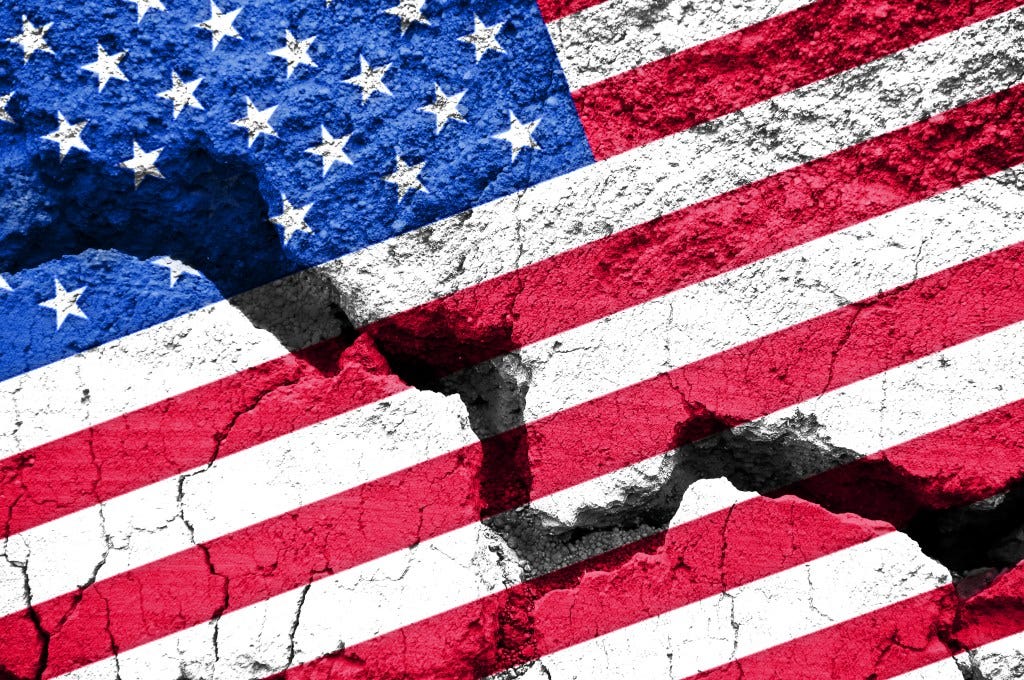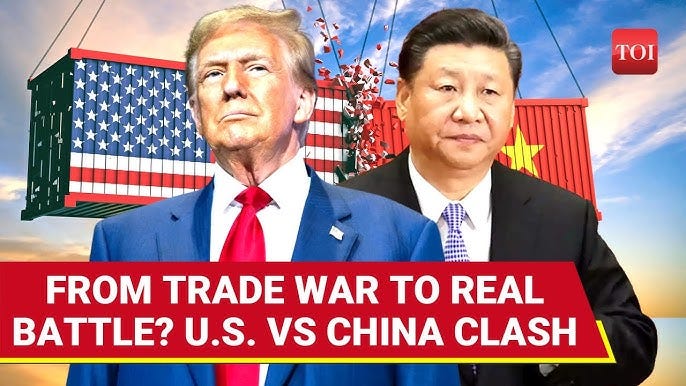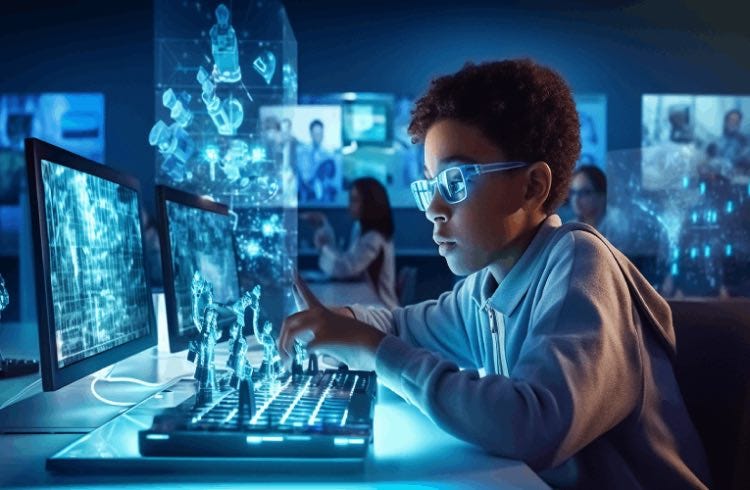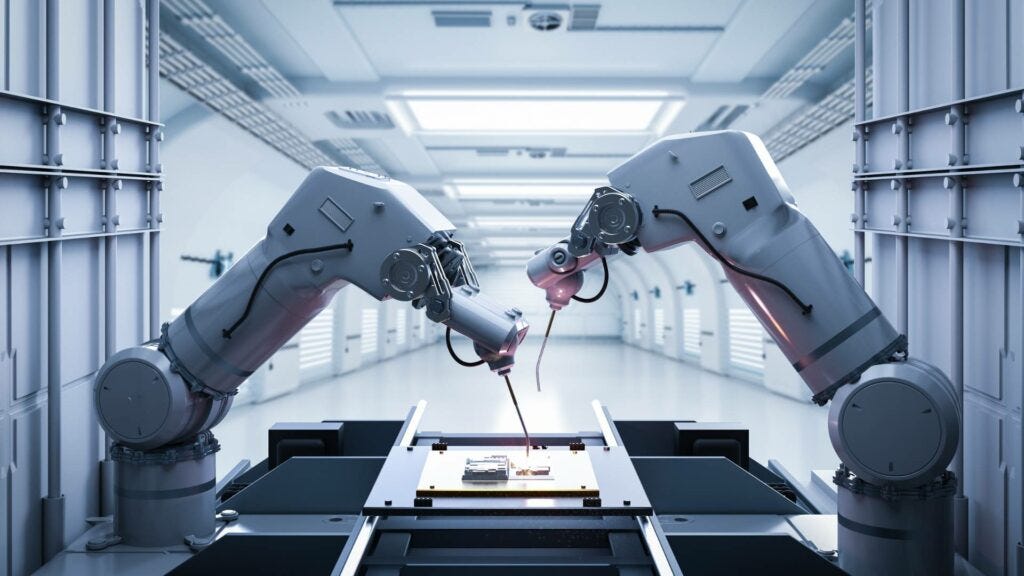Ray Dalio Reveals America’s Hidden Civil War and The AI Race
An In-Depth Analysis of Ray Dalio’s Interview on The Tucker Carlson Show
Introduction: The Battle for the Future
In a world where technological innovation, economic power, and global geopolitics are constantly shifting, Ray Dalio’s insights provide a stark look at the future of the United States. In an interview on The Tucker Carlson Show, Dalio discusses America’s mounting internal challenges, from the growing debt crisis to the battle for technological supremacy against China. He presents a nuanced view of how the U.S. must adapt to maintain its competitive edge and global leadership.
As Dalio touches on everything from the implications of artificial intelligence to the future of work and the economy, his perspective raises urgent questions about the nation's ability to navigate these deepening divides.
The deep fractures within American society
The shifting balance of power between the U.S. and China
The debt crisis and its long-term consequences
The impact of AI on academia, economics, and global stability
What truly makes people happy beyond wealth and power
As these forces collide, the world is entering a new era of competition, uncertainty, and opportunity. Dalio provides a sobering yet insightful roadmap for what lies ahead—and how the U.S. must adapt to avoid decline.
America’s Hidden Civil War: Why the U.S. is More Divided Than Ever
Dalio opens the conversation with a bold assertion: the U.S. is in the midst of a civil war—but not in the traditional sense of armies clashing on battlefields. Instead, it is a war of ideas, values, and economic interests, one that is tearing the country apart from within.
"We are in a civil war. It’s not the kind of civil war where you have a shooting war, but you have irreconcilable differences, and you have people willing to fight for them in ways that threaten the system."
The Roots of Division: A Historical Cycle
Dalio explains that history moves in cycles, and America is currently in a phase where internal conflict and power struggles intensify. He compares today’s tensions to previous turning points in history, such as:
The Great Depression and the rise of socialism vs. capitalism
The late 1960s and 1970s, were marked by political assassinations, protests, and economic stagnation
The final years of the Roman Empire, where internal corruption and division led to collapse
The core issue, according to Dalio, is that the country is no longer united by a shared set of values or goals. Instead, political and ideological factions are fighting for dominance, unwilling to compromise.
What Happens When a Country Becomes This Divided?
Dalio warns that deep polarization leads to instability. If trust in institutions erodes, people stop believing in elections, laws, and even the very idea of democracy. The result? A nation that is unable to function effectively—leading to economic decline, political chaos, and potential violence.
“If you study history, when these kinds of irreconcilable differences exist, you get revolutions, you get civil wars, and you get massive shifts in power.”
How Can America Avoid Collapse?
Dalio argues that leaders must find a way to restore unity—but that requires acknowledging the crisis rather than ignoring it. He believes that a functioning society must have a balance between competition and cooperation. Without cooperation, the U.S. will continue to spiral into deeper dysfunction.
🔹 The U.S. is at a breaking point. If political division continues unchecked, it could lead to economic and institutional collapse. The question is whether the country can find a path toward unity before it’s too late.
The U.S. vs. China: The Battle for Global Supremacy
One of the most urgent global shifts happening today is the rapid rise of China as an economic and technological superpower. While the U.S. once dominated manufacturing, trade, and innovation, China has caught up—and in some areas, surpassed the West.
Dalio explains that the U.S. and China are now in a full-scale competition for global influence.
"China now produces more than the United States, Europe, and Japan combined. They are ahead in many technologies, particularly in AI and robotics."
The Strengths and Weaknesses of Each Nation
Both the U.S. and China have distinct advantages and disadvantages in this global race:
Dalio explains that the U.S. still has a competitive edge in areas like high-level innovation (e.g., Nobel Prize winners, elite universities), but its weakness in manufacturing and production could be its downfall.
Can the U.S. Win This Competition?
Dalio warns that economic protectionism and isolation won’t work. Instead, the U.S. must:
Invest in advanced manufacturing instead of relying on China
Strengthen its AI and tech sector to remain competitive
Create policies that attract the best global talent
🔹 The U.S. can’t outproduce China, but it can out-innovate—if it plays its cards right.
The Debt Crisis: Why America is at Financial Risk
In this section of the interview, Dalio explores the financial challenges facing the United States, particularly its growing national debt and the unsustainable fiscal policies that are pushing the country toward an inevitable crisis.
Dalio emphasizes that the U.S. government’s debt load has reached staggering levels, and while this has been a concern for decades, the situation has now become critical.
“We’re talking about a $33 trillion debt, and the costs of servicing that debt are only going to rise. It’s unsustainable in the long term, and there’s no serious plan to deal with it.
The Debt: A Time Bomb Waiting to Explode
The national debt has skyrocketed in recent years due to government spending on various entitlement programs, military expenditures, and economic stimulus packages. However, Dalio warns that the real threat lies not in the debt itself, but in the growing interest payments that the U.S. will need to make to service it. As interest rates rise, these payments will increase, consuming a larger share of the federal budget.
Dalio believes that at some point, the U.S. will face a choice:
Cut spending and face severe domestic consequences
Print more money (which leads to inflation and devaluation of the currency)
“We’re going to see a major financial crisis if we don’t take this seriously. And it’s not just about the debt. It’s about the policies and the lack of discipline that got us here.”
Global Implications: The Dollar and Economic Stability
The U.S. dollar has long been the global reserve currency, but Dalio suggests that the growing debt and lack of fiscal discipline could lead to loss of confidence in the dollar. If countries start shifting away from the dollar in favor of other currencies, it could send shockwaves through the global economy.
Dalio points out that China and other nations are already taking steps to de-dollarize their economies, using alternatives like the Chinese yuan or digital currencies.
What Can Be Done?
Dalio advocates for long-term fiscal responsibility, urging policymakers to enact structural reforms in entitlement programs and reduce government spending. However, he also emphasizes that such reforms will require political courage and an acknowledgment of the severity of the situation.
“The debt crisis is coming. We need a clear, bipartisan solution that addresses the root causes. If we don’t, it will be too late.”
🔹 The U.S. is on the brink of a debt crisis. The country’s inability to address its growing fiscal challenges could lead to economic turmoil and the decline of the dollar as the global standard.
The Alleged Secret 100-Year Deal Between Ukraine and Britain
The central theme in the interview is the theory surrounding a secret 100-year agreement between Ukraine and Britain, which may be influencing current geopolitical dynamics. This theory is raised by Tom Luongo, who frames the situation as part of a much larger geopolitical game, one involving not just Ukraine but key international players like the UK, Russia, and the US. According to Tom, the situation in Ukraine is not just the result of a regional conflict but is instead part of a broader, more complex series of maneuvers orchestrated by global elites, with Britain playing a pivotal role.
The Future of Academia and AI’s Impact on Education
One of the most fascinating aspects of the interview is Dalio’s thoughts on the future of education, particularly in light of artificial intelligence and automation. He believes that AI has the potential to revolutionize how we think about education, but it also poses significant challenges to traditional academic structures.
Dalio begins by pointing out that the current model of academia—universities, degree programs, and the overall system of education—is outdated and increasingly irrelevant in the modern world.
“The way we’ve structured education doesn’t make sense in the context of a rapidly changing world. We’re relying on an old model that no longer works for the majority of people.”
AI and the Evolution of Knowledge
AI has reached the point where it can now process and understand complex knowledge across a wide range of disciplines. Dalio suggests that, in the future, machines could replace many roles in academia by offering more personalized learning, 24/7 access to knowledge, and adaptive education tools.
However, he also warns that this shift could fundamentally change the role of universities and professors.
“We’re not far from a time when machines will have the equivalent knowledge of a PhD in every field. So, why do we still need universities in their current form?”
The Rise of Interactive Learning
Dalio envisions a world where education is not just about sitting in a classroom listening to lectures but about interactive, personalized learning experiences. He sees a future in which people engage with knowledge in real-time, using advanced technologies like virtual reality (VR), augmented reality (AR), and AI-driven platforms to gain skills in a more hands-on, immersive way. This would allow students to not only learn information but also apply it immediately in practical situations.
“The future of education will be more like a video game, where you have real-world learning experiences that can be interacted with on a deeper level.”
Impact on Traditional Institutions
Dalio acknowledges that this transformation won’t happen overnight, but the change is inevitable. Traditional institutions, like universities, will be forced to adapt or become obsolete.
He believes that the slow-moving nature of academic institutions could prevent them from adjusting quickly enough to these technological advancements, leaving them behind the curve.
What Happens to Professors?
In this brave new world, Dalio suggests that teaching professionals may shift their focus from providing basic knowledge to becoming facilitators who guide students through personalized learning experiences. This will require a drastic shift in how professors view their role, moving away from the traditional teaching model and toward more interactive and collaborative approaches.
🔹 AI is transforming education, and universities will need to adapt quickly to remain relevant. The traditional model of education is no longer sustainable, and the future will be dominated by interactive, personalized learning powered by technology.
AI, Automation, and the Future of Work
The rise of artificial intelligence and automation is one of the most significant shifts in the modern economy, and Dalio shares his thoughts on how these technologies will impact the future of work. He acknowledges that automation will eliminate many jobs, but it will also create new opportunities for those who can adapt.
The Automation Revolution
Dalio explains that AI and robotics are already changing the landscape of manufacturing, logistics, and service industries, and that trend will only accelerate. Machines are becoming increasingly capable of performing tasks that were once exclusively human, including in areas like:
Manufacturing and production
Transportation and delivery (e.g., self-driving trucks)
Healthcare (e.g., diagnostic AI tools)
Customer service (e.g., chatbots, virtual assistants)
Dalio warns that workers in low-skill jobs are the most vulnerable to displacement by these technologies, and economic inequality could widen as a result.
Adapting to a New Economy
Despite these challenges, Dalio believes that AI and automation can also create new opportunities. People who can acquire new skills—especially in fields like AI development, data science, and high-level problem-solving—will thrive in this new economy.
Dalio also highlights the importance of creativity and emotional intelligence, skills that are difficult for machines to replicate. He suggests that these uniquely human traits will become even more valuable as AI takes over routine tasks.
“Machines are good at doing repetitive tasks, but they can’t match human creativity or emotional intelligence. The future of work will be about adapting to a world where we collaborate with machines, not compete with them.”
🔹 The future of work will require adaptability. While many jobs will be displaced by AI, new opportunities will emerge for those who can embrace technology and creativity. The key to thriving in this future is learning new skills and collaborating with machines.
What Truly Makes People Happy?
In the final section of the interview, Dalio shifts focus to a more philosophical question: What really makes people happy? He believes that economic power and material wealth do not necessarily lead to happiness. Instead, true happiness comes from a sense of community, purpose, and well-being.
Dalio cites his own experience growing up in a modest household, where his father, a jazz musician, taught him that happiness was not about wealth but about relationships, emotional fulfillment, and having meaningful goals.
Happiness Beyond Material Wealth
Dalio points to studies that show that countries with high levels of economic prosperity often don’t correlate with happiness. For example, the U.S. has one of the highest levels of economic power but also ranks poorly on measures of life expectancy and happiness compared to countries like Canada and Indonesia, which have lower levels of wealth but higher happiness ratings.
“The highest determinant of happiness is community. If you have strong relationships and a sense of belonging, that leads to greater fulfillment.”
The Importance of Social Harmony
Dalio concludes that achieving harmony within society—between individuals, communities, and nations—is the key to both personal happiness and global stability. While technology and economic growth are important, they cannot replace the fundamental need for connection and purpose.
🔹 Happiness is not about wealth or success. It is about community, emotional well-being, and having meaningful relationships. As the world becomes more connected and automated, society must focus on creating harmony and fulfillment for all people.
A Call to Action for America’s Future
As we look at the big picture Ray Dalio paints, it's easy to feel uneasy. There's a lot happening in the world today—competition with China, advances in AI, and big changes in our economy and society. But we don’t have to feel lost in all of this. In fact, Dalio’s message gives us hope.
Even in uncertain times, the strength of our creativity, our ability to work together, and the values we share as humans are what will guide us forward. The race for technological power is real, but it’s also a chance for us to come together, learn from one another, and build a future where we all thrive. It’s not about fighting or being left behind—it’s about finding new ways to work together, stay united, and grow.
So, while the road ahead might seem complicated, remember that we all have a role to play in shaping the future. We can be part of a world where progress and harmony go hand in hand. And together, we can face whatever comes next, knowing that we’re stronger as a community.
Support My Work – Help Secure a Stronger Future
If you enjoy reading Financial Anarchy and find value in the content I produce, I would greatly appreciate your support through a paid subscription or donation. While all my work is available for free, your support helps me maintain and grow this platform while providing for my family.
Your contributions allow me to continue creating high-quality, insightful material on finance, economics, and global events—without relying on outside funding. This means I can remain independent and focused on delivering the content that matters to you.
Becoming a paid supporter, even at a small level, helps improve my financial stability, allowing me to dedicate more time and resources to producing content you love. Every donation makes a difference, and your support truly means the world to me and my family.
Thank you for being part of Financial Anarchy. Together, we can continue to grow this community and keep the content coming!












